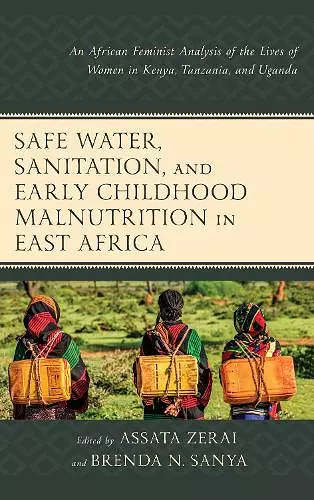Safe Water, Sanitation, and Early Childhood Malnutrition in East Africa
An African Feminist Analysis of the Lives of Women in Kenya, Tanzania, and Uganda
Assata Zerai editor Brenda N Sanya editor
Format:Hardback
Publisher:Lexington Books
Published:10th Jan '18
Currently unavailable, and unfortunately no date known when it will be back

To understand safe water and sanitation in East Africa, it is important to consider the contributions of African feminist analysis. This perspective will unveil inequities in the distribution of resources, demonstrate how localized solutions which are driven by women’s collaborative work have had an impact by temporarily easing the burden, and paint a multilayered picture of the lives of women and girls who are the predominant providers of water to households. This book explores the effects of water and sanitation quality and availability on early childhood morbidity in East Africa from an African feminist sociological perspective. It presents a framework that considers the ways that the development industry, neoliberalism, neocolonial relations, gender, class, ethnicity, globalization, and other dimensions of oppression intersect to impact upon the experiences and agency of women and children accessing clean water and safe sanitation and reducing early childhood morbidity in Kenya, Tanzania and Uganda. This work offers a vital contribution to the social scientific literature by adapting the vibrant intellectual work of African feminists to a quantitative methodology and enlarging the scope of empirically and theoretically grounded studies within the field of environmental sociology.
Too often, the debates on development and gender are either too abstract or too technical. This book strikes the right balance to deliver practical and transformational knowledge. Assata Zerai and Brenda Sanya, along with a diverse group of scholars, offer a rich analysis of everyday development challenges (safe water, sanitation, and health) through an African feminist lens. In this book, they simultaneously examine the common challenges in achieving core development goals and provide a powerful critique of the gendered development knowledge system. By simply asking 'Where are the women?', they provide a catalytic perspective for weaving Africanist, feminist, and social justice discourses into a compelling analysis of everyday development challenges and structural inequality in Kenya, Tanzania, and Uganda and a liberating critique of gendered knowledge in development studies. In the end, they not only expand our understanding of how the exclusion of women from policy design and implementation happens, but also elucidate the consequences of women’s exclusion on households and communities. More importantly, they remind us that a crucial source of social change is the efforts of mothers, health professionals, and activists to advocate for clean water, safe sanitation, and health resources. -- Abu Bakarr Bah, Northern Illinois University
For African feminists on the African continent and in the diaspora, this book provides a theoretical and empirical vindication for the long-held view that without the voices of African and girls informing research and development efforts, the cycle of inequality and poverty will continue unabated. The co-editors, Assata Zerai and Brenda Sanya, have used their own ‘voices’, research interests, and activism to assemble a group of feminist scholars to dialogue on the ways in which the lives of women and children in the three east African countries are negatively impacted by poor access to water and sanitation. Together and individually, the chapters provide a rich theoretical and empirical analysis of how the continuing marginalization of women and girls’ voices from research and development efforts only exacerbates their suffering and leads to further gendered negative health and other development outcomes. The book promises to be a wonderful resource for feminist and development scholars, not only in East Africa, but throughout the continent and beyond. -- Relebohile Moletsane, University of KwaZulu-Natal
ISBN: 9781498520836
Dimensions: 240mm x 157mm x 20mm
Weight: 472g
188 pages